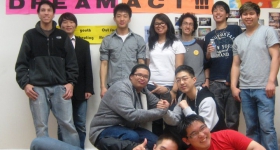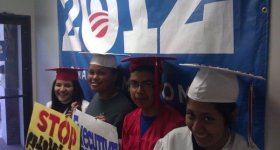by Andres Caballero
Originally posted at New America Media.
High school and college students in New York, who for years have been lobbying Congress to pass legislation that would bring undocumented students closer to their dream of attending college and pursuing a career, said last week they are not giving up the fight after lawmakers again refused to consider the Dream Act.
The Development, Relief and Education for Alien Minors Act would pave a path to citizenship for undocumented students who arrived in the United States as minors, by giving them access to higher education and the ability to serve in the military. The bill has been introduced numerous times without success. Last week it stalled again, falling four votes short of a motion that would have allowed Sen. Harry Reid (D-NV) to introduce it as part of a defense allocation bill.
Yessica Martinez, 17, an undocumented student who arrived from Medellin, Colombia when she was 10, underwent an emotional rollercoaster during last week’s legislative battle. For three years, she has been a Dream Act activist at Francis Lewis High School in Queens, where she is an honor student. Though she said she was upset, she was not defeated.
“We’re going to fight until this happens, and if it doesn’t happen today, it’s going to happen tomorrow; and even if it doesn’t happen then, we’re going to keep fighting until it does,” said Martinez, who wants to go to college to study journalism.
A 2010 report released by the American Immigration Council estimates that there are 1.5 million undocumented children in the United States; every year, 65,000 undocumented students who have lived in the United States for over five years graduate from high school.
Without a legal status, undocumented adolescents cannot obtain a driver’s license in most states or apply for federal financial aid to pay for their studies. Also, because most lack a work permit and social security number, they can’t be employed. So, at a time when most young people begin dreaming about the future, for these students there is none.
“You grow up thinking you can do everything you want to do but it’s not true. You can’t do all the things all American adults can,” said Angy Rivera, 20, who came to the United States from Armenia, Colombia with her mother at age 3 and is in the country illegally. She lives in Queens and is a freshman at John Jay College of Criminal Justice. She hopes to one day help fight human and animal abuse.
“I feel like my future always has to be decided by a congressman or somebody else,” added Rivera.
The New York Immigration Coalition, an umbrella organization for 200 groups representing the state’s 4 million immigrants, condemned the Senate’s decision to discard the Dream Act and called for more pressure on legislators.
Americans for Legal Immigration, a political action committee based in North Carolina, celebrated the bill’s defeat. The committee’s president, William Gheen, said the attempt to bring the Dream Act back to legislation failed because the vast majority of Americans reject all forms of amnesty for undocumented immigrants.
“Those students should blame their parents for invading another nation illegally and should return to the nations they are citizens of,” said Gheen.
But student activists from the New York State Youth Leadership Council --a youth-led network that represents high schools, colleges and community-based organizations to improve equal opportunity in education for immigrants-- have a different outcome in mind.
Sonia Guinansaca, 21, a Hunter College student and active member of the organization, boarded a 5 a.m. bus to Washington D.C. on September 23, along with 15 fellow activists to begin a new round of lobbying, two days after the bill was defeated.
“People are saying that the Dream Act has fallen, or (wait until) next year for (the) Dream Act. No! We want the Dream Act now,” said Guinansaca, who came from Ecuador when she was 5 and is also undocumented.
Her group made more than 25,000 calls last week and it is now pushing for a stand-alone bill to be introduced and voted on before the elections.
“It was amazing to see the undocumented and supporters of undocumented youth mobilizing,” said Guinansaca. “We are very energized and ready. This was not a step back, but a step up.”
S.J. Jung, president of MinKwon Center for Community Action -- a New York-based Korean American organization that works to educate community members about issues affecting immigrant communities -- said his group will push for the Dream Act one more time before the “lame duck session,” the period between the November elections and the arrival of newly elected officials in December.
“If Republicans gain more seats during the November elections, that would obviously create more problems for our nation and it will be tougher for us to push forward the Dream Act,” said Jung.
The pro-immigrant organization, Reform Immigration for America, indicated through a press release that last week, pro-Dream Act advocates carried out 70 events in 26 different states, made over 50,000 calls and sent 90,000 faxes to senators.
“It is up to us, and how strong of a public momentum we can generate,” said Jung.









Comments